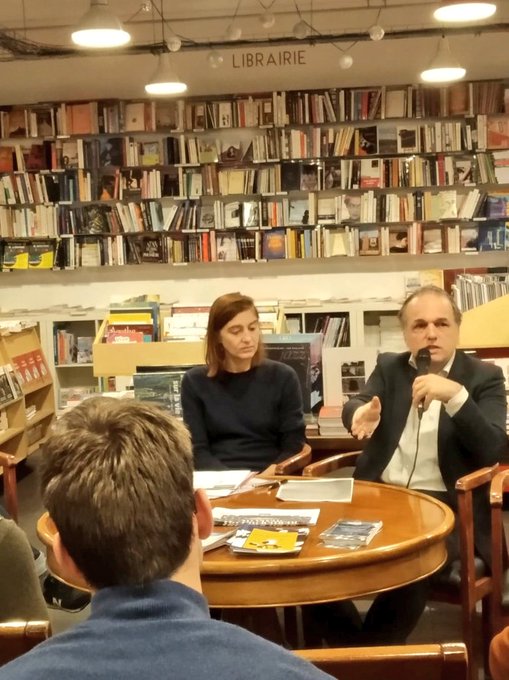In Paris for a coffee debate on the theme “New Commission, new perspectives”.

The European Movement – Paris organised a coffee debate at the Hundred and Eight in the 19th arrondissement of Paris on Thursday 21 November 2019, with Estelle Poidevin from the Representation of the European Commission in France and Yves Bertoncini, President of the European Movement – France.
The debate was an opportunity to discuss the new von der Leyen Commission and the possible challenges it will face. Estelle Poidevin immediately pointed out that the European Right (EPP) and the Socialists (S&D) do not hold a majority on their own. This shows the changing political topography of Europe, which in itself will bring its own challenges for this new Commission. Nevertheless, the proposed new team, according to Estelle Poidevin, “tried to respect political, geographical and almost perfect parity balances“.
Yves Bertoncini noted that the new president of the Commission “was well inspired to propose a geopolitical Commission” because of three main elements: the climate challenge, the migration challenge and the instability of the world. He also pointed out that these elements explain the increased mobilization for the European elections in France, noting that “the European deputies elected in France were elected with a higher turnout than our national deputies. It must be reported for a question of legitimacy”.
As far as legitimacy is concerned, it is true that Ursula von der Leyen has less legitimacy than Jean-Claude Junker, who was the head of the winning party’s list in the 2014 European elections. Yves Bertoncini notes that “the President is in a delicate position where she was elected by 9 votes and must manage this partisan pluralism” arguing that “the protection of the European way of life was used to obtain the votes of the radical right. This responds to an anxiety of Europeans outside a political calculation”.
Then the debate turned to the EU’s external relations with other countries. Estelle Poidevin noted that in the current international environment, “relations between the United Kingdom and the United States are more than uncertain” and may pose a challenge to the future Commission, particularly in the field of trade. Yves Bertoncini added that Europe “will maintain relations with the UK perhaps as well as with Switzerland, but it will remain a regression in the history of the European Union. On their side they did not come out of the brambles, especially with Scotland”.
The rest of the coffee debate included questions from the floor, including the question of relations between the EU and Turkey. Estelle Poidevin clarified that the EU “has reduced pre-accession aid in the budget proposal”. Yves Bertoncini added that it is normal for the EU to reduce pre-accession aid, adding that “Erdogan no longer wants to join the European Union”.
How can European citizens be sure that the Green New Deal is not greenwashing? Estelle Poidevin replied that there is such an expectation on the part of both Member States and citizens, particularly young people who have been strongly mobilised on this subject, that “the Commission cannot do greenwashing… the Green New Deal is at the heart of Ursula von der Leyen’s agenda”. She also added that “the Commission can no longer work only on the economy because there are high expectations from citizens on taxation and social matters”.
Finally, Yves Bertoncini clarified the position of the Movement, the Maisons de l’Europe and the Young Europeans – France, who “are mobilising with Gabriel Attal to ensure that the Universal National Service (UNS) includes a module on Europe and that young people are involved with European civil society”.